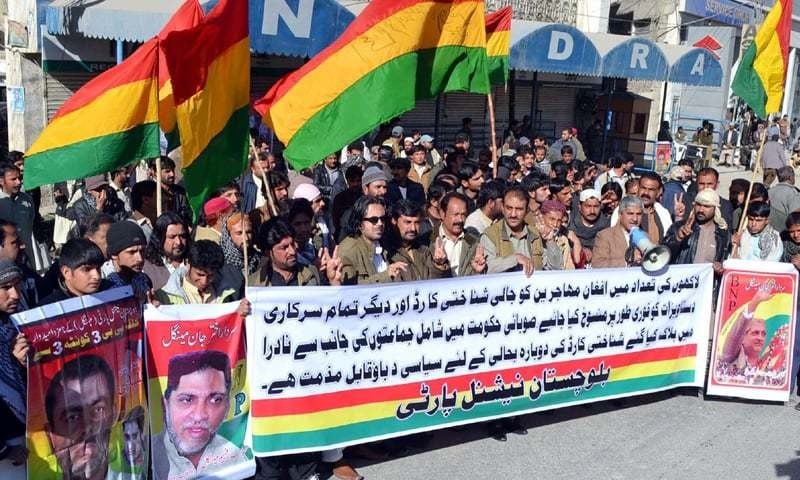
Sarfraz Bugti’s statement about Afghan refugees has rekindled the old debate about Baloch majority in the province

As the Pakistan government faced the embarrassing drone killing of the Afghan Taliban leader Mullah Mansoor near the Nushki district of Balochistan, the province’s Minister for Home and Tribal Affairs Sarfraz Bugti issued a statement that rekindled the old debate regarding demographic changes in the province.
Disclosing the arrest of six Afghans working for Afghanistan’s spy agency National Directorate of Security (NDS) on charges of carrying out terror attacks, Bugti spoke strongly against the Afghan refugees, claiming they were involved in terrorism and criminal activities. He said the refugees should leave Balochistan otherwise they would be forcibly evicted. Surprisingly, the nationalist parties that otherwise remain very critical of Bugti’s statements on other issues, such as the ongoing operation, the missing persons and killings, supported him on this issue.
The Baloch and Pashtuns are the two major ethnic groups of the province, followed by Punjabis, Hazaras and Sindhis. Balochistan shares a 700-mile border with Afghanistan’s Kandahar, Zabul and Helmand provinces.
Baloch parties, especially the Balochistan National Party (BNP), complain that tens of thousands of Afghan refugees have got national identity cards (CNICs), passports and other legal documents in Balochistan, with the support of Pashtun political parties which has changed the entire demography of the province, especially its capital Quetta.
Agha Hassan Baloch, the BNP’s central secretary information, says his party demands of the government to make arrangements for early repatriation of Afghan refugees to their own country and cancel their identity cards. Citing the figures of the 2011 census, which shows that Balochistan’s population doubled from 6.5 million in 1998 to 13 million in 2011, Baloch says the percentage of Balochi speakers in the province has come down drastically.
"Four Pashtun-majority districts -- Pishin, Killa Abdullah, Loralai and Zhob -- have witnessed over 250 per cent increase," says Baloch. "It is a conspiracy to convert the Baloch into a minority in their own province."
Recently, the National Database Registration Authority’s (Nadra) Director General Balochistan, Mir Ajam Khan Durrani, in his letter to the office of the Nadra chairman, alleged that leaders of Pakhtunkhwa Milli Awami Party (PkMAP), a key Pashtun nationalist party, were allegedly threatening senior officials of the Nadra to clear tens of thousands of blocked CNICs of foreigners, mainly Afghans.
Pashtun parties, on the other hand, argue the Pashtuns have very low representation in the provincial government due to miscalculation of their population. Leaders say the last census held in 1998 was under-reported in the Pashtun parts of the province and therefore it prompted the party to boycott the census. "In fact, a large Pashtun population was deliberately kept out in the 1998 census and in the recent house count, it witnessed high population increase, not because of influx of Afghan refugees," a PkMAP’s central leader tells TNS.
Abdul Majeed Achakzai, another PkMAP leader who is also a member of the Balochistan Assembly, says his party has complained against the allegedly corrupt officials at the Nadra who made fake indentity cards and included those names among the local residents of Pashtun districts. This resulted in blocking the identity cards of thousands of Pashtuns. "Also, under an agreement of governments of Pakistan and Afghanistan and the UNHCR, Afghan refugees have been living in the country and the UNHCR has their complete records," Achakzai maintains.
Pashtun parties claim they are equal in population if not more. But on the other hand, Baloch groups say they are in majority in 22 out of 30 districts while the number of Pashtun districts is hardly eight and the entire land area of all Pashtun districts remains smaller than one Baloch district, Chaghi.
Baloch politicians also claim that all natural resources such as gas, gold and copper and most importantly seaport are located in the Baloch areas. Pashtun areas do not contribute any such significant natural resources that could help in the economic growth of the province.
Political analysts believe that strong differences exist over the population figures between the parties representing both the communities. The situation particularly became tense when the PkMAP, in general election 2013, managed to win in two Baloch-majority constituencies of provincial assembly from Quetta and one National Assembly seat NA-260, consisting of Baloch-populated districts of Chaghi and Nushki with a part of Quetta.
BNP’s Baloch, who also contested from NA-260, alleges poll rigging in Quetta. "From Iran’s border to Quetta airport, a Baloch-populated 650 kilometres area, the PkMAP did not get sufficient votes and its candidate won only from an area spanning approximately six kilometres. It shows the impact of Afghan refugees’s influx who have got Pakistani idendity cards," he says.
However, a journalist who covered the elections in Quetta says that PkMAP won seats from Baloch-populated areas of Quetta due to demographic changes there, the split of Baloch ethnic votes into two parties -- BNP and National Party (NP), another Baloch ethnic party led by Dr Abdul Malik Baloch, and call for boycott of elections by Baloch National Front, an alliance of eight Baloch groups. The NP is a coalition partner in Balochistan government with the PkMAP and the PML-N.